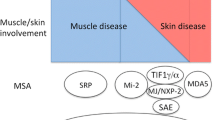Abstract
The aim of this study was to examine the frequency and significance of antibodies targeting the small ubiquitin-like modifier 1 activating enzyme (SAE) in patients under serologic evaluation for idiopathic inflammatory myopathies. Patient sera (n = 17) recognizing bands at approximately 40 (SAE1) and 90 (SAE2) kDa were identified in 6445 consecutive samples for myositis autoantibody evaluation by immunoprecipitation (IP) of S35-labeled K562 cell lysate. All 17 positive samples, 176 disease, and 67 healthy controls were evaluated for SAE1 antibodies using a line immunoblot assay (LIA). Clinical data of SAE antibody-positive patients were obtained by retrospective chart review. Positivity with both methods was associated with a diagnosis dermatomyositis with characteristic skin manifestations of varying severity and muscle involvement. Majority of the patients were female (73.7%), mean age of 55.0 (range 12.0–82.0) years at the time of testing. Using the IP as reference, the SAE1 LIA had a sensitivity of 100% (95% CI 82.4–100%), specificity of 99.6% (95% CI 97.7–100%), positive predictive value of 95.0% (95% CI 75.1–99.9%), and negative predictive value of 100% (95% CI 98.5–100%). This study confirms the association of SAE antibodies in patients with dermatomyositis. A combination of IP and the LIA specific for SAE1 may be useful in antibody detection.


Similar content being viewed by others
References
Betteridge Z, McHugh N. Myositis-specific autoantibodies: an important tool to support diagnosis of myositis. J Intern Med. 2016;280:8–23.
Satoh M, Tanaka S, Ceribelli A, Calise SJ, Chan EK. A Comprehensive overview on myositis-specific antibodies: new and old biomarkers in idiopathic inflammatory myopathy. Clin Rev Allergy Immunol. 2017;52:1–19.
Betteridge Z, Gunawardena H, North J, Slinn J, McHugh N. Identification of a novel autoantibody directed against small ubiquitin-like modifier activating enzyme in dermatomyositis. Arthritis Rheum. 2007;56:3132–7.
Fiorentino DF, Chung LS, Christopher-Stine L, Zaba L, Li S, Mammen AL, et al. Most patients with cancer-associated dermatomyositis have antibodies to nuclear matrix protein NXP-2 or transcription intermediary factor 1γ. Arthritis Rheum. 2013;65:2954–62.
Moghadam-Kia S, Oddis CV, Sato S, Kuwana M, Aggarwal R. Anti-melanoma differentiation-associated gene 5 is associated with rapidly progressive lung disease and poor survival in US patients with amyopathic and myopathic dermatomyositis. Arthritis Care Res. 2016;68:689–94.
Betteridge ZE, Gunawardena H, Chinoy H, North J, Ollier WER, Cooper RG, et al. Clinical and human leucocyte antigen class II haplotype associations of autoantibodies to small ubiquitin-like modifier enzyme, a dermatomyositis-specific autoantigen target, in UK Caucasian adult-onset myositis. Ann Rheum Dis. 2009;68:1621–5.
Tarricone E, Ghirardello A, Rampudda M, Bassi N, Punzi L, Doria A. Anti-SAE antibodies in autoimmune myositis: identification by unlabelled protein immunoprecipitation in an Italian patient cohort. J Immunol Methods. 2012;384:128–34.
Cavazzana I, Fredi M, Ceribelli A, Mordenti C, Ferrari F, Carabellese N, et al. Testing for myositis specific autoantibodies: comparison between line blot and immunoprecipitation assays in 57 myositis sera. J Immunol Methods. 2016;433:1–5.
Bodoki L, Nagy-Vincze M, Griger Z, Betteridge Z, Szöllősi L, Dankó K. Four dermatomyositis-specific autoantibodies-anti-TIF1γ, anti-NXP2, anti-SAE and anti-MDA5-in adult and juvenile patients with idiopathic inflammatory myopathies in a Hungarian cohort. Autoimmun Rev. 2014;13:1211–9.
Fujimoto M, Matsushita T, Hamaguchi Y, Kaji K, Asano Y, Ogawa F, et al. Autoantibodies to small ubiquitin-like modifier activating enzymes in Japanese patients with dermatomyositis: comparison with a UK Caucasian cohort. Ann Rheum Dis. 2013;72:151–3.
Muro Y, Sugiura K, Nara M, Sakamoto I, Suzuki N, Akiyama M. High incidence of cancer in anti-small ubiquitin-like modifier activating enzyme antibody-positive dermatomyositis. Rheumatology (Oxford). 2015;54:1745–7.
Muro Y, Sugiura K, Akiyama M. Low prevalence of anti-small ubiquitin-like modifier activating enzyme antibodies in dermatomyositis patients. Autoimmunity. 2013;46:279–84.
Acknowledgements
The authors thank all of the physicians who kindly provided feedback on the clinical and demographic data for the SAE antibody-positive patients.
Funding
This study was funded by the ARUP Institute for Clinical and Experimental Pathology, Salt Lake City, UT.
Author information
Authors and Affiliations
Corresponding author
Ethics declarations
Conflict of interest
The authors declare that they have no conflict of interest.
Ethical approval
This study was approved by the Institutional Review Boards (IRB #29507) at the University of Utah School of Medicine, Salt Lake City. All procedures performed in studies involving human participants were in accordance with the ethical standards of the institutional and/or national research committee and with the 1964 Helsinki declaration and its later amendments or comparable ethical standards. For this type of study formal consent is not required.
Rights and permissions
About this article
Cite this article
Peterson, L.K., Jaskowski, T.D., La’ulu, S.L. et al. Antibodies to small ubiquitin-like modifier activating enzyme are associated with a diagnosis of dermatomyositis: results from an unselected cohort. Immunol Res 66, 431–436 (2018). https://doi.org/10.1007/s12026-018-9006-7
Published:
Issue Date:
DOI: https://doi.org/10.1007/s12026-018-9006-7




